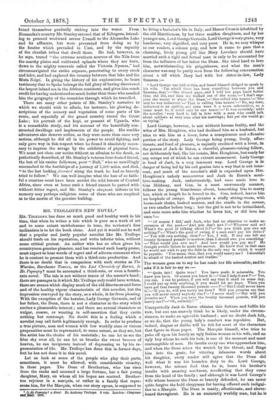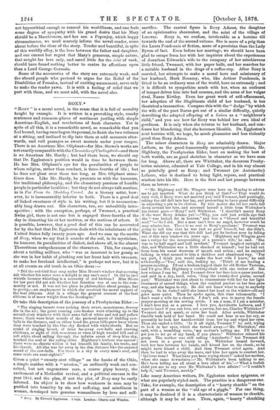MR. TROLLOPE'S NEW NOVEL.*
M. TROLLOPE has done so much good and healthy work in his time, that when he writes a tale which is poor as a work of art and to some extent unwholesome in tone, the reviewer's first inclination is to let the book alone. And yet it would not be well that a popular and justly popular novelist like Mr. Trollops should trade on his reputation, and write inferior tales, without some critical protest. An author who has so often given his countrymen genuine pleasure, and has received such hearty praise, must expect to hear words of regret and of adverse comment when he is content to present them with a third-rate production. And Ihere is no doubt that in comparison with such stories as The Warden, Barchester Towers, or the Last Chronicle of Barset, Is He Popenjoy? must be accounted a third-rate, or even a fourth- _rate novel. The tale is not without traces of the master's hand ; there are passages in it which Mr. Trollope only could have written, there are scenes which display much of the old directness and force and of the healthy vigour characteristic of this novelist, but the impression conveyed by the story, as a whole, is far from pleasing. With the exception of the heroine,'Lady George Germain, and of her father, the Dean, there is not a character in the story which ,excites a pleasurable interest ; and there are several characters so vulgar, coarse, or wanting in self-assertion that they excite nothing but contempt. No doubt this is a feeling which a novelist may call forth legitimately enough. In order to produce a true picture, men and women with low worldly aims or vicious propensities must be represented, to some extent, as they are, but the artist has the choice of his materials ; he can let us see the blue sky over all, he can let us breathe the sweet breezes of heaven, he can invigorate instead of depressing us by his re- presentation of life. Mr. Trollope has done this in former days, but he has not done it in this novel.
Let us look at some of the people who play their parts, sometimes, it must be allowed, with considerable vivacity, in these pages. The Dean of Brotherton, who has risen from the ranks and amassed a large fortune, has a fair young daughter, Mary, on whom all his hopes are centred. Brother- ton rejoices in a marquis, or rather in a family that repre- sents him, for the Marquis, when our story opens, is supposed to
71a He Pommy t a ar B Ant}, and -°"-• - Trollopu 3 vols. London: Chspalsa
be living a bachelor's life in Italy, and Manor Cross is inhabited by the old Marchioness, by her three maiden daughters, and by her younger son, Lord George Germain. Lord George is very grave, very handsome, very dignified, and very poor. He is, we may whisper to our readers, a solemn prig, and how it came to pass that a charming, lively young girl like Mary Lovelace should have married such a rigid and formal man is only to be accounted for from the influence of her father the Dean. She tried hard to love him, notwithstanding his priggishness, and what the man's character was may be partly seen from the following conversation about a tiff which Mary had with her sister-in-law, Lady Susanna :—
" Lord George was told of this, and found himself obliged to speak to his wife. I'm afraid there has been something between you and Susanna, dear.'—' She abused papa, and I told her papa know better than she did, and then she walked out of the room.'—' I don't sup- pose she meant to abuse the Dean.'—' She called him names.'—' She said he was indiscreet.'—' That is calling him names.'—' No, my dear, indiscreet is an epithet, and even were it a noun substantive, as a name must be, it could only be one name.'—' It was certainly,' adds the novelist, very bard to fall in love with a man who could talk about epithets so very soon after his marriage; but yet she would go on trying.'" Lord George, however, is not without human frailty, and the wiles of Mrs. Houghton, who had declined him as a husband, but tries to win him as a lover, form a conspicuous and o ffensite portion of the story. Lady George being young, lively, affec- tionate, and fond of pleasure, is unjustly credited with a lover, in
the person of Jack de Baron, a cheerful, pleasure-taking fellow, not deliberately bad, like his cousin, Mrs. Houghton, but ready for any scrape out of which he can extract amusement. Lady George is fond of Jack, in a very innocent way. Lord George is in danger of being led by his evil genius into a way that is not inno- cent, and much of the novelist's skill is expended upon Mrs. Houghton's unholy manoeuvres and Jack de Baron's semi- love-making. Jack, unfortunately, had once made love to Gus Mildmay, and Gus, in a most unwomanly manner, follows the young Guardsman about, beseeching him to marry her, which at length he is forced to do. Gus, indeed, leaves him no loophole of escape. He pictures a stuffy sitting-room, with horse-hair chairs, hashed mutton, and the cradle in the corner, or two cradles before long ; but the girl is not to be intimidated, and once more asks him whether he loves her, or did love her Once?—
"' Of course I did,' said Jack, who had no objection to make as- surances of the past.—' And you don't now ?'—' Whoever said so? What's the good of talking about it ?'—' Do you think you owe me nothing?'—' What's the good of owing, if a man can't pay his debts ?' —' You will own nothing, then ?'—' Yes, I will. If any one left me twenty thousand pounds to-morrow, then I should owe you something.' What would you owe me? And how would you pay me?' He thought awhile before he made his answer. He knew that in that else ho would not wish to pay the debt in the only way in which it would be payable. You mean, then, that you would marry me ? I shouldn't be afraid of the hashed mutton and cradles.'"
The woman goes on to say he has made her life miserable, and he asks if it is fair to say so :—
", Quite fair ! Quite true I You have made it miserable. You
know you have. Of course you know Can I help it now Yes, you can. I can be patient, if you will say that it shall be some day. I could put up with anything, if you would let me hope. When you
have got that twenty thousand pounds But I shall never have If you do, will you marry me then ? Will you promise me that
you will never marry anybody else I never shall.'—' But will you promise me ? When you have the twenty thousand pounds, will you marry me ?'—' Oh, certainly!'"
Unexpectedly Jack de Baron obtains this fortune and fulfils his vow, but one can scarcely think he is likely, under the circum- stances, to make an agreeable husband ; and no doubt Jack felt, as we do, that the young lady's conduct was repulsive. But, indeed, disgust or dislike will be felt for most of the characters that figure in these pages. The Marquis himself, who tries to palm off upon his family an ugly Italian woman as his wife, and an ugly boy whom he calls his heir, is one of the meanest and most contemptible of men. Ile insults every one who approaches him, and when the Dean seizes the wretch by the throat, and flings him into the grate, for uttering infamous words about his daughter, every reader will agree that the Dean did well what it was his bounden duty to do. Lord George, however, the solemn fool that he is, bears his brother's insults with amazing meekness, recollecting that they come from the head of the family ; and although it was Lord George's wife whose honour the Dean so bravely defended, he can never quite forgive the bold clergyman for having offered such indigni- ties to a Marquis. The Dean is manly, affectionate, and above- board throughout. He is an eminently worldly man, but lie is
not hypocritical enough to conceal his worldliness, and one feels some degree of sympathy with his grand desire that his Mary should be a Marchioness, and her son a Popenjoy, which happy circumstances, we need scarcely inform the novel-reader, come about before the close of the story. Tender and beautiful, in spite of this worldly alloy, is the love between the father and daughter, and one cannot but regret that Mary's generous, simple nature, that sought for love only, and cared little for the éclat of rank, should have found nothing better to centre its affections upon than a Lord George Germain.
Some of the accessories of the story are extremely weak, and the absurd people who pretend to argue for the Relief of the Disabilities of Females, instead of exciting amusement, serve only to make the reader yawn. It is with a feeling of relief that we part with them, and we must add, with the novel also.



































 Previous page
Previous page